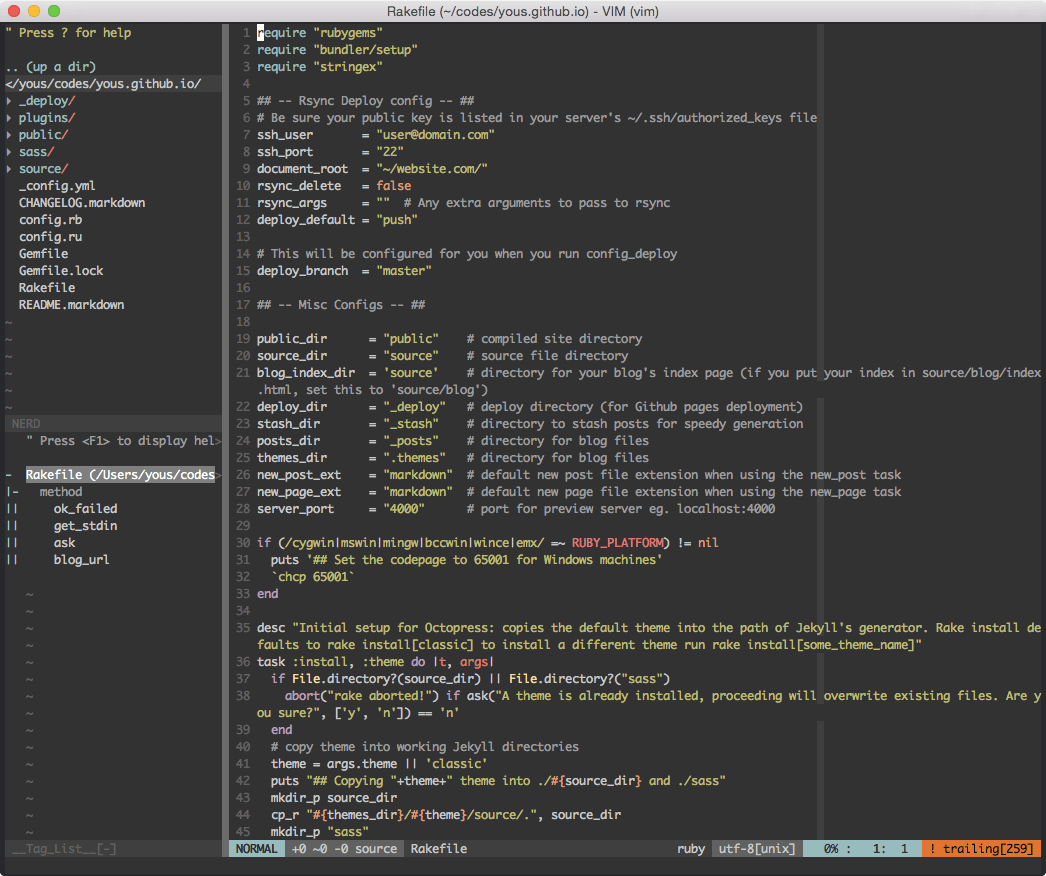Automatically Quit Vim if Actual Files are Closed

Sidebar
Many Vim user use plugins which open sidebar like NERDTree or Tag List. In my case, I always open NERDTree and Tag List on Vim startup. Their file and tag navigation features are extremely handy.
We use :q to quit, :q! or ZQ to quit without saving, :wq, :x or ZZ to save and quit. But these commands are applied to only one buffer. NERDTree or Tag List windows are not closed until we close them individually or quit all using :qa.
Getting into the Problem
But as one of the Vim users, I close it within a few minutes or even a few seconds after I opened it. I want to keep quitting Vim easy. Using :qa everytime doesn’t make sence. Actually, NERDTree gives us a tip to close Vim if the only window left open is a NERDTree:
autocmd bufenter * if (winnr("$") == 1 && exists("b:NERDTreeType") && b:NERDTreeType == "primary") | q | endif
If I close the last window when a NERDTree exists, Vim automatically closes. But what if we have Tag List window also? winnr("$") returns the current window count, so the above code triggers only when the window count is 1. So Vim will quit automatically only when NERDTree is the last window.
Not Interesting Buffer
There are some types of window which isn’t important while quitting Vim.
Help
We can look up documentation of Vim itself or its plugins by
:helpor:hcommand. This is one of the most powerful features of Vim, but these windows aren’t editable and we don’t need them while quitting Vim.QuickFix
Some plugins like Syntastic or Vim RuboCop show errors on QuickFix window and Vim supports navigating them with
:cnextand:cprev. There windows aren’t needed also.NERDTree and Tag List
Here is where we started.
Investigate the Buffer
Vim buffers have its type. Help and QuickFix buffers also have it so we’re ready to go. See 'buftype' documentation:
*'buftype'* *'bt'* *E382*
'buftype' 'bt' string (default: "")
local to buffer
{not in Vi}
{not available when compiled without the |+quickfix|
feature}
The value of this option specifies the type of a buffer:
<empty> normal buffer
nofile buffer which is not related to a file and will not be
written
nowrite buffer which will not be written
acwrite buffer which will always be written with BufWriteCmd
autocommands. {not available when compiled without the
|+autocmd| feature}
quickfix quickfix buffer, contains list of errors |:cwindow|
or list of locations |:lwindow|
help help buffer (you are not supposed to set this
manually)
Because quickfix and help type is already exists, all we have to do is retrieve that value. This code returns the buftype of current buffer:
getbufvar(winbufnr(0), '&buftype')
Note that winbufnr(0) returns the number of the buffer in the current window.
For NERDTree and Tag List, we check the name of the buffer.
bufname(winbufnr(0))
NERDTree has t:NERDTreeBufName for this, Tag List has same name for every buffer; __Tag_List__.
So we can check whether the current buffer is NERDTree or not with this:
exists('t:NERDTreeBufName') && bufname(winbufnr(0)) == t:NERDTreeBufName
For Tag List:
bufname(winbufnr(0)) == '__Tag_List__'
Automatically Quit Vim
We can check the current buffer is important or not. Then how can we check that for every buffer? Now do some basic programming.
function! CheckLeftBuffers()
if tabpagenr('$') == 1
let i = 1
while i <= winnr('$')
if getbufvar(winbufnr(i), '&buftype') == 'help' ||
\ getbufvar(winbufnr(i), '&buftype') == 'quickfix' ||
\ exists('t:NERDTreeBufName') &&
\ bufname(winbufnr(i)) == t:NERDTreeBufName ||
\ bufname(winbufnr(i)) == '__Tag_List__'
let i += 1
else
break
endif
endwhile
if i == winnr('$') + 1
qall
endif
unlet i
endif
endfunction
autocmd BufEnter * call CheckLeftBuffers()
Note that CheckLeftBuffers() will check buffers only when the tab page count is 1. It iterates every window and check its 'buftype' is 'help' or 'quickfix'. If every window is Help window or QuickFix window, i becomes winnr('$') + 1. Then we’re safe to quit all windows by calling qall. Finally we add CheckLeftBuffers() to BufEnter *, so it’ll be called on everytime we close a window—on the fly!
You can see my actual vimrc commit and also check out my dotfiles repo!
Update: In gVim, executing
qallwon’t work. You can use this line instead ofqall:call feedkeys(":qall\<CR>", 'n')Update: If you have multiple tabs open,
qallwill close all buffers left. You may want to close only the current tab with:q, then you can use theonlycommand:call feedkeys(":only\<CR>:q\<CR>", 'n')
This will work with other Vim distributions. If it doesn’t or if you have another problems, feel free to make an issue or contact me.